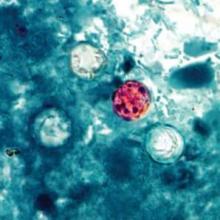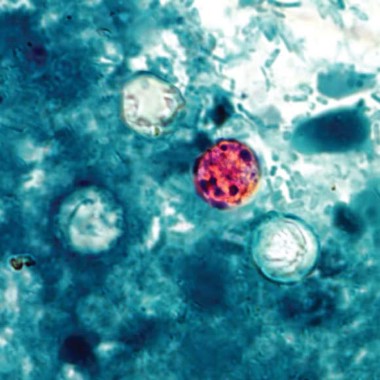User login
Patients with watery diarrhea that does not resolve over several days should be tested specifically for Cyclospora infection, according to Dr. Tom Frieden, director of the Centers for Disease Control and Prevention.
The CDC is investigating an outbreak of Cyclospora infections in conjunction with federal and local partners, including the Food and Drug Administration. The first lab-confirmed cases reported to the CDC were in Iowa in two people who had not traveled internationally for 14 days before the onset of the illness.
As of July 24, the CDC had been notified of 285 cases of Cyclospora infection in multiple states, including Iowa, Nebraska, Texas, Wisconsin, Georgia, Minnesota, Connecticut, New Jersey, and Ohio, Dr. Frieden said during a CDC telebriefing on July 25. Additionally, single cases were reported in both Illinois and Kansas that may have been acquired in another state.
Most patients became ill in June or early July, and it is too soon to say whether the outbreak is ongoing or subsiding, he said. "We have not yet identified a source, although I am confident we will," he added.
Infection with the parasite Cyclospora cayetanensis typically causes watery diarrhea. "People who have illness that hasn’t gone away on its own in several days should see their health care provider, and discuss the possibility of Cyclospora," he said. Testing of stool samples for Cyclospora "should be specifically requested in people who’ve had diarrheal illness that hasn’t gone away in several days."
While the cause of the current outbreak has not yet been identified, Dr. Frieden said that the best way to prevent infection is to avoid food or water that may have been contaminated with the parasite and to carefully wash fresh produce before eating.
Cyclospora can stick to some foods, though, so washing produce can be helpful but does not eliminate the risk, he noted.
Patients with watery diarrhea that does not resolve over several days should be tested specifically for Cyclospora infection, according to Dr. Tom Frieden, director of the Centers for Disease Control and Prevention.
The CDC is investigating an outbreak of Cyclospora infections in conjunction with federal and local partners, including the Food and Drug Administration. The first lab-confirmed cases reported to the CDC were in Iowa in two people who had not traveled internationally for 14 days before the onset of the illness.
As of July 24, the CDC had been notified of 285 cases of Cyclospora infection in multiple states, including Iowa, Nebraska, Texas, Wisconsin, Georgia, Minnesota, Connecticut, New Jersey, and Ohio, Dr. Frieden said during a CDC telebriefing on July 25. Additionally, single cases were reported in both Illinois and Kansas that may have been acquired in another state.
Most patients became ill in June or early July, and it is too soon to say whether the outbreak is ongoing or subsiding, he said. "We have not yet identified a source, although I am confident we will," he added.
Infection with the parasite Cyclospora cayetanensis typically causes watery diarrhea. "People who have illness that hasn’t gone away on its own in several days should see their health care provider, and discuss the possibility of Cyclospora," he said. Testing of stool samples for Cyclospora "should be specifically requested in people who’ve had diarrheal illness that hasn’t gone away in several days."
While the cause of the current outbreak has not yet been identified, Dr. Frieden said that the best way to prevent infection is to avoid food or water that may have been contaminated with the parasite and to carefully wash fresh produce before eating.
Cyclospora can stick to some foods, though, so washing produce can be helpful but does not eliminate the risk, he noted.
Patients with watery diarrhea that does not resolve over several days should be tested specifically for Cyclospora infection, according to Dr. Tom Frieden, director of the Centers for Disease Control and Prevention.
The CDC is investigating an outbreak of Cyclospora infections in conjunction with federal and local partners, including the Food and Drug Administration. The first lab-confirmed cases reported to the CDC were in Iowa in two people who had not traveled internationally for 14 days before the onset of the illness.
As of July 24, the CDC had been notified of 285 cases of Cyclospora infection in multiple states, including Iowa, Nebraska, Texas, Wisconsin, Georgia, Minnesota, Connecticut, New Jersey, and Ohio, Dr. Frieden said during a CDC telebriefing on July 25. Additionally, single cases were reported in both Illinois and Kansas that may have been acquired in another state.
Most patients became ill in June or early July, and it is too soon to say whether the outbreak is ongoing or subsiding, he said. "We have not yet identified a source, although I am confident we will," he added.
Infection with the parasite Cyclospora cayetanensis typically causes watery diarrhea. "People who have illness that hasn’t gone away on its own in several days should see their health care provider, and discuss the possibility of Cyclospora," he said. Testing of stool samples for Cyclospora "should be specifically requested in people who’ve had diarrheal illness that hasn’t gone away in several days."
While the cause of the current outbreak has not yet been identified, Dr. Frieden said that the best way to prevent infection is to avoid food or water that may have been contaminated with the parasite and to carefully wash fresh produce before eating.
Cyclospora can stick to some foods, though, so washing produce can be helpful but does not eliminate the risk, he noted.
FROM A PRESS BRIEFING HELD BY THE CDC

